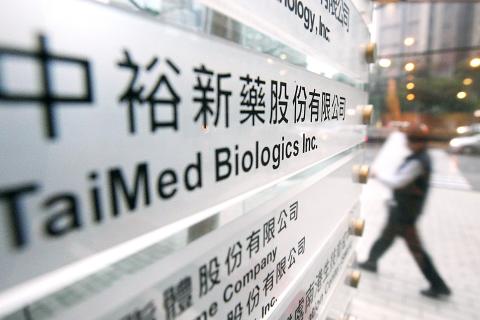|
2012 ELECTIONS: KMT
attacks Tsai on Yu Chang
ULTERIOR MOTIVES? KMT Legislator Chiu Yi said
two documents detailing Yu Chang’s creation proved that Tsai abused her role for
her own gain in 2007
By Amy Su / Staff Reporter

The nameplate of TaiMed Biologics
is pictured yesterday in Taipei’s Nangang District.
Photo: CNA
Chinese Nationalist Party (KMT) lawmakers
yesterday questioned the procedural legality of the state-owned National
Development Fund’s (NDF) investment in Yu Chang Biologics Co (宇昌生技股份有限公司) in
2007, following the declassification of two documents relating to the
investment.
In addition, legislators reiterated accusations against Democratic Progressive
Party (DPP) presidential candidate Tsai Ing-wen (蔡英文), who was vice premier at
the time, of privately profiting from the investment deal.
The two declassified documents were sent by then-minister without portfolio Ho
Mei-yueh (何美玥) on Feb. 9, 2007, and on March 21, 2007, respectively.
The first document, which stated that the fund would invest US$20 million in a
company that would work with US firm Genentech Inc under three conditions, was
sent to then-premier Su Tseng-chang (蘇貞昌) and Tsai for approval, evidence the
case did not follow the NDF’s general review procedures.
The files show that Tsai signed two documents on a deal with the US biotech firm
Genentech, a member of the Roche Group, for the development of a new AIDS drug
known as Anti-CD4, and the drug’s third-stage clinical trial.
However, the second document, which offered more details about the deal and made
first mention of the company’s English name — “TaiMed Group” — were sent only to
Tsai, for approval.
TaiMed was Yu Chang’s predecessor, which Tsai became chairperson of a few months
after resigning as vice premier.
KMT lawmakers questioned Ho’s motives for not sending the documents under her
titles of Council for Economic Planning and Development (CEPD) chairperson or
NDF convener, since she had taken the two positions at the end of January 2007.
KMT caucus whip Lin Yi-shih (林益世) questioned whether Tsai had known she would
become chairperson at Yu Chang before she approved the documents, since the
second document proved that the idea of the company already existed.
The fund’s data show that TaiMed held a conference for potential investors on
March 31, 2007, and the conference’s report listed Tsai as one of the company’s
four key principals.
KMT Legislator Hsieh Kuo-liang (謝國樑) said Tsai might have broken the “revolving
door” clause on officials and private sector work, since a key principal would
generally become a company executive or be closely connect to its operation.
“The two documents have almost confirmed that Tsai played an authority-abusing
role to enrich herself from the deal,” KMT Legislator Chiu Yi (邱毅) said.
Chiu accused Tsai of lying when she said on Friday that that she was not
involved in the start-up.
Chiu asked Tsai to give a clear account of how much money the Tsai family placed
in Yu Chang’s accounts.
“The account had no money until the DPP administration appropriated money from
the NDF,” he said.
Council for Economic Planning and Development Minister Christina Liu (劉憶如), who
submitted the declassified documents to the legislature, said the two documents
did not clarify why the investment deal was managed as a “special project”
approved by the Cabinet, instead of following the NDF’s general application
procedures.
However, even for a special project, the case did not fully follow the complete
procedures like the other projects, Liu said, adding that “the lack of an exact
company name and an official proposal” were major problems in evaluating the
case’s legitimacy.
The Chinese name of TaiMed first appeared in the letter sent by Tsai to the fund
on July 2007, asking it to wire NT$40 million (US$1.3 million) to the “TaiMed
Inc Preparatory Office” account before Sept. 3 of the same year, Liu said.
Another letter was sent on the same day saying the company’s name had been
changed to Yu Chang, finally connecting TaiMed with Yu Chung, Liu said.
Additional reporting by Shih Hsiu-chuan
|
![]()
![]()
![]()